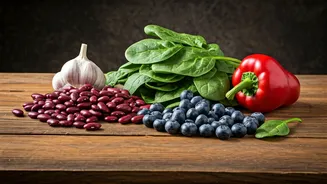Kidney Health Explained
The kidneys, two bean-shaped organs, are crucial for filtering waste and excess fluids from your blood. They perform essential tasks like regulating blood pressure,
producing hormones, and maintaining electrolyte balance. This intricate filtration process ensures the removal of toxins, while retaining vital substances. A balanced diet and lifestyle play a significant role in kidney function. Therefore, understanding the impact of food choices is paramount to preserving kidney health and preventing potential complications. The kidneys work like an internal purifier, diligently cleaning the blood around the clock. By choosing foods that support their function, you're investing in your long-term health and vitality. Prioritizing kidney health helps in maintaining overall wellness and prevents the development of kidney-related diseases. Awareness and proactive measures concerning kidney health contribute to a healthier lifestyle.
Red Bell Peppers
Red bell peppers are packed with vitamins, minerals, and antioxidants, and they are beneficial for kidney health. They are a great source of Vitamin C and Vitamin A, essential for immune function and overall well-being. Furthermore, they are low in potassium, making them a safe choice for those with kidney issues. Red bell peppers can be added to salads, stir-fries, or enjoyed raw as a snack. They also contain antioxidants, which help reduce inflammation and protect the kidneys from damage. The vibrant color of these peppers indicates the presence of beneficial phytonutrients that work to keep your kidneys working well. They can be roasted, grilled, or eaten fresh to boost your meal's nutritional value. These peppers provide a refreshing crunch and add flavor while supporting kidney function. The high fiber content in bell peppers aids in digestion and helps regulate blood sugar levels, contributing to kidney health.
Cabbage for Detox
Cabbage is a cruciferous vegetable known for its cleansing properties, which can aid kidney function. Cabbage is low in potassium, making it a kidney-friendly option. It is rich in vitamins C and K, and it contains fiber. Cabbage also features compounds like glucosinolates, which support the liver in its detoxification process. Consuming cabbage can indirectly help the kidneys by reducing the burden on them. It can be consumed raw in salads, fermented as sauerkraut, or cooked in soups and stews. It's a versatile vegetable that is also rich in antioxidants, helping to combat free radicals that can harm the kidneys. It provides a satisfying crunch and subtly sweet flavor. Integrating cabbage into your diet is a simple step toward supporting overall health. By promoting detoxification, cabbage aids in maintaining optimal kidney function and protecting against damage.
Cauliflower's Benefits
Cauliflower, like cabbage, belongs to the cruciferous family, and it is a beneficial addition to a kidney-friendly diet. Cauliflower is low in potassium, providing essential nutrients without overburdening the kidneys. This vegetable is an excellent source of vitamin C, fiber, and folate, contributing to overall health. It contains compounds that help the liver in detoxification, similar to cabbage. Eating cauliflower helps the body get rid of toxins. You can roast it, steam it, or add it to your favorite recipes. The versatility of cauliflower makes it easy to incorporate into your meals. It provides a satisfying texture and mild flavor, making it appealing to many people. By including cauliflower, you’re taking a proactive step in protecting your kidneys. Consuming cauliflower regularly is a simple dietary adjustment that supports the body's natural detoxification processes and promotes kidney health.
Garlic's Advantages
Garlic is celebrated for its potent medicinal properties, which can benefit various bodily systems. Garlic contains allicin, a compound with anti-inflammatory and antioxidant effects. Garlic supports kidney health by reducing inflammation and protecting against oxidative stress. Garlic consumption can also help lower cholesterol levels. This is beneficial for kidney health. It is often included in savory dishes, such as curries, stir-fries, and soups. Garlic can be enjoyed raw, roasted, or added to sauces, enhancing the flavor of any meal. Incorporating garlic into your diet is a flavorful way to support your kidneys. By reducing inflammation, garlic aids in maintaining optimal kidney function and promoting overall health. The versatile nature of garlic makes it easy to integrate into your daily meals, thus contributing to a healthier lifestyle.
Onions & Protection
Onions are another excellent addition to a kidney-friendly diet, offering various health advantages. Onions have anti-inflammatory and antioxidant properties, which are beneficial for kidney health. They are rich in flavonoids, particularly quercetin, which helps protect against damage. Onions are also low in potassium, making them a safe choice for those with kidney issues. You can add onions to various dishes, such as soups, stews, and salads. Whether raw, caramelized, or cooked, onions add a depth of flavor. By consuming onions, you provide your body with essential nutrients and support your kidneys. They assist in preventing damage and reducing inflammation. Including onions in your diet is a delicious and simple way to enhance kidney function and contribute to overall wellness. The versatility of onions ensures they can be easily integrated into your daily meals.













